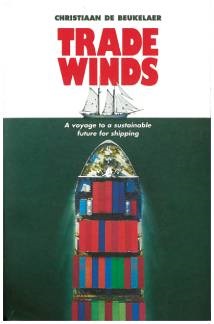Can we blow away maritime's carbon crisis?
Trade Winds, by Christiaan De Beukelaer
With m aritime decarbonisation well and truly on the agenda, there has been a recent surge of interest in wind propulsion for cargo vessels. Christiaan De Beukelaer is a Fellow of the Royal Geographical Society whose sailing hobby led him to explore the possibilities of using this old-fashioned method in modern supply chains, and he has written this fascinating account of what it is like to put wind power into practice.
aritime decarbonisation well and truly on the agenda, there has been a recent surge of interest in wind propulsion for cargo vessels. Christiaan De Beukelaer is a Fellow of the Royal Geographical Society whose sailing hobby led him to explore the possibilities of using this old-fashioned method in modern supply chains, and he has written this fascinating account of what it is like to put wind power into practice.
Like our featured book in the previous issue of the Telegraph, Trade Winds focuses on a voyage that was unexpectedly disrupted by the Covid-19 pandemic. De Beukelaer joined Avontuur, the world's largest sailing cargo vessel, in the Canary Islands for a voyage to pick up rum, coffee and cacao in the Caribbean and transport them to Germany. He was hoping to spend three weeks finding out more about the movement to bring back emission-free propulsion. Instead he found himself trapped onboard for five months.
This adds an element of tension and adventure to an account of how entrepreneurs and sailing enthusiasts are attempting to make a difference for the planet by transporting goods the traditional way, rather than relying on what De Beukelaer calls 'horrendously polluting, but frighteningly convenient, fossil fuels'.
The book is very well written, and it is interesting to read about the practical details of navigation, work and social life onboard such an unusual vessel. There are also maps, illustrations and images of the vessel during its voyage.
Potential readers who wonder whether this will book will be a lecture on environmentalism can be reassured that it is a fair account. It's clear where De Beukelaer's heart lies – he shows that the well-meaning attempts to transport goods by wind ship can inspire hope that a different kind of global economy is possible. However, he is also honest in his scepticism about whether a large-scale transformation to this planet-friendly propulsion system is ultimately possible. He doesn't shrink from the challenges involved, from the amount of timber required to build sailing vessels to the need for maritime professionals with particular specialist skills.
Still, the advocates for wind technology aren't going to give up. Only time will tell if they are successful in making a real difference to the maritime industry's carbon emissions.
Trade Winds: a voyage to a sustainable future for shipping
By Christiaan De Beukelaer
Manchester University Press, £20.00
ISBN: 978 15261 163097
Buy this book in the Nautilus Bookshop
While you're there, why not browse the rest of the titles in our unique maritime bookshop, which sells all the books reviewed on these pages.
Buy nowMore Books
Scottish city's maritime heart
Glasgow Harbour By Graeme Smith and Mike McCreeryFew places are as closely tied to maritime heritage as Glasgow. In this richly illustrated guide, Graeme Smith and Mike McCreery trace the history of the city's Clydeside harbour from its beginnings in the 17th century to its present-day redevelopment.
Standing the test of tide
Piers of England and Wales By Steve EdmundsIn this richly illustrated guide, Steve Edmunds takes readers on a tour of the iconic structures that blend land and sea – home to all manner of amusements and amenities.
Maritime mystery tour
Irish Sea Lime Trade, by David JohnsonIn his attractively-presented book, David Johnson takes us on a tour of historical sites in the Irish Sea lime trade, from South Pembrokeshire up to the Solway Firth, and across to the Isle of Man and Ireland.
From seafarer to force of nature
Gale Force 10, by Nicholas CourtneyFrances Beaufort was born in Ireland to a family of Huguenot descent, and first went to sea in 1789 onboard the ill-fated British East India Company vessel Vansittart. In a fascinating career, he is best known for creating the Beaufort Wind Scale.
